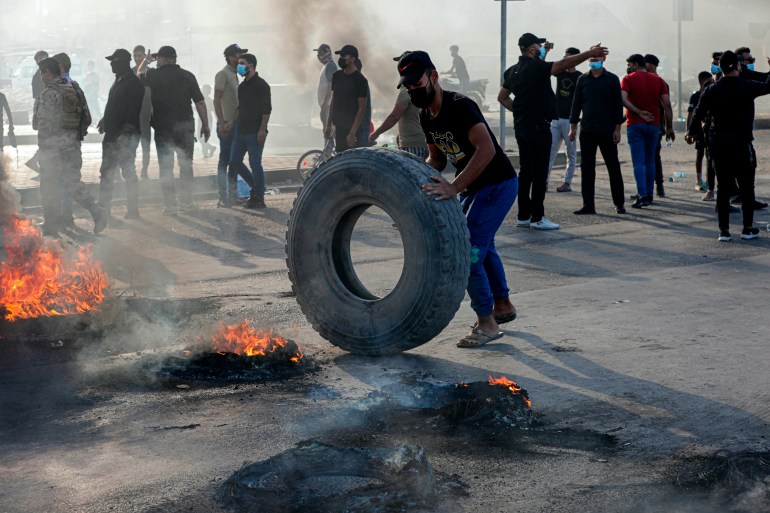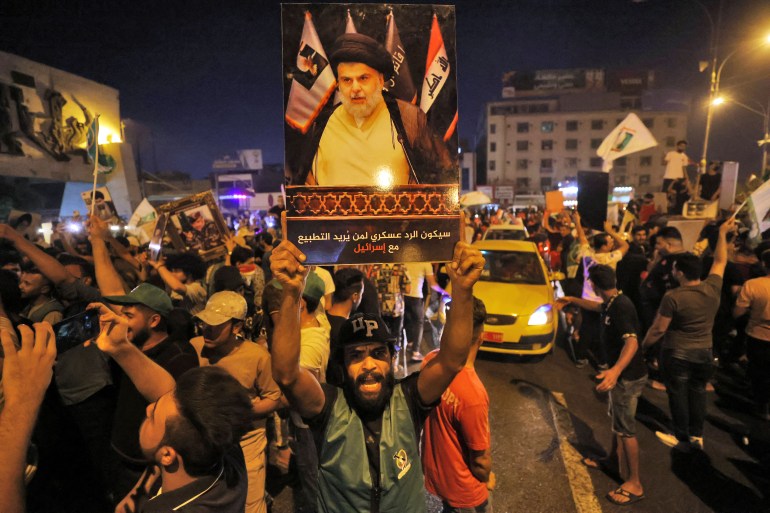Iraq election body soon to announce final results after recount
Iraq’s independent election commission received more than 1,300 complaints following the elections lodged by Shia groups alleging vote fraud.

Iraq’s independent election commission is set to release its final decision on complaints received after the October 10 parliamentary elections.
The country scarred by endemic corruption and low public confidence is entering a potentially tumultuous government formation process mired by layers of uncertainty and instability.
Keep reading
list of 4 itemsWhat’s next for Iraq’s powerful leader Muqtada al-Sadr?
Turkey extends Syria and Iraq military missions by two years
ISIL attack on Iraqi village kills 11 ‘defenceless civilians’
The commission received more than 1,300 appeals following the elections, lodged by the “Shia cooperation framework” – an ad hoc group consisting mostly of Shia groups that suffered large losses in the elections – alleging “fraud” in the voting process.
They rejected the outcome, accusing the electoral commission of not correcting “major violations” in the vote count, and blaming it for “the failure of the electoral process”.
After an initial assessment, the IHEC threw out the majority of the complaints, citing a “lack of evidence”, and said it would release its final decisions on the rest of the appeals before submitting them to the Supreme Court for final certification.

On Wednesday, the election commission began its recount. The IHEC said it would “manually recount the votes of the 234 contested electoral stations based on 18 appeals distributed across the governorates Salah al-Din, Basra, and Baghdad”, as it was “supported by evidence”, according to a statement.
It is unclear exactly when it will release the final results after the recount.
Iraq’s sixth parliamentary election since the 2003 US-led invasion saw the lowest voter turnout since the new political system was established after Saddam Hussein was toppled, with a total of 41 percent.
‘The biggest fraud’
Despite becoming one of the central demands that emerged from the mass demonstrations in 2019, the early election attracted few people’s political attentiveness as many stayed at home on election day either in an effort to delegitimise the political system or as a result of political apathy.
Benefitting from the low voter turnout, the Sadrist Movement bloc, led by the prominent Shia scholar Muqtada al-Sadr, who has strong devoted voter base, came out as the biggest winner, snatching 73 seats in the 329-member Iraqi assembly, giving the increasingly prominent political figure a lion’s share in the incoming parliament.
The Taqadum party led by the current Parliament Speaker Mohammed al-Halbousi, a Sunni, came second with 37 seats, while former prime minister Nouri al-Maliki’s State of Law bloc performed better than expected winning 35 seats.
The group that sustained the biggest blow was the Fatah alliance, an Iran-backed umbrella militia group headed by Hadi al-Amiri of the Badr Organization, having only secured 17 seats – a significant drop from the 48 seats it previously held in parliament.
“Sadrists’ authority came from the fact that few people would vote, yet those with strong devotion to the political party would vote no matter what,” explained Marsin al-Shamary on the reasons behind the Sadrist Movement’s apparent win.
“Had we had an election with higher turnout, they would not have done this well,” she added.
The Fatah group and its allies were explicitly discontent towards the election result. Soon after the commission released the final preliminary results, the Iraqi Kataib Hezbollah spokesperson Abu Ali Askari posted a statement on Telegram and accused the election of being “the biggest fraud” and essentially called for military action.
Protests on the streets
Demonstrations soon followed. In Baghdad, protesters close to Fatah took to the streets to demand a recount of votes, and some even tried to storm the Green Zone where many government offices and embassies are located. Video shared online showed protesters edging closer to the Green Zone while chanting slogans in support of the Fatah group.
Despite having acknowledged some complaints related to certain polling stations, the election commission spokesperson told the media he did “not expect there to be major changes following the recount”, meaning the current results could still stand and the political balance in Iraq will not be drastically changed.
“Challenging election results in Iraq isn’t new – it happened in 2010, 2014, and now 2021,” said Hamzeh Hadad, an Iraq-based political analyst.
“But with the elimination of out-of-country voting, which used to witness more incidents of election rigging, it’s possible to say these appeals simply mean [the losing parties] weren’t happy with the results – without any specific evidence to back up their fraud claims.”

Despite Fatah group’s apparent loss of a number of seats in the incoming parliament, analysts said its popularity in Iraq was not necessarily overshadowed by the Sadrist Movement.
According to preliminary results, Fatah and its allies received an estimated 670,000 votes in total while the Sadrists received 650,000. Yet Fatah lagged far behind in parliamentary seats, largely because of the newly introduced electoral law, which requires careful calibration in allocating candidates to different districts.
“Although it may look like the Sadrists and Fateh have completely different levels of popularity, in reality the results reveal the sophistication and coherence of the Sadrist electoral machine and the challenges presented by the new electoral system,” wrote Renad Mansour and Victoria Steward-Jolley of Chatham House, a UK-based think-tank, in a recent commentary.
Additionally, despite having lost a big number of seats, the Fatah group, according to some analysts, still retains a strong say in the upcoming government negotiation process.
The Babylon Movement, a Christian group that has won four of the five mandatory quota seats reserved for the Christian minority, is a close ally of Fatah and will essentially serve as the group’s “bonus seats”, according to Hadad.
‘Continue to suffer’
Even as some groups have threatened to initiate violence if the final results of the elections are the same as the preliminary ones, the fallout might not be necessarily as worrying as some might imagine.
“The most these parties that lost will do at this time is to protest in Baghdad as a show of force, which is something any political party would do had they done poorly in an election,” said Hadad. “I don’t think the Fatah group will escalate the violence too much, given the fact that they still have enough support for negotiation.”
Nonetheless, what awaits for Iraq is the all-too-familiar process of government formation negotiations, which, according to many Iraqis, would simply reinforce the governing elite’s grip on the country.
“I don’t care about the election results just like I didn’t care for voting,” said Ali, a 23-year-old Baghdad resident who participated in the 2019 protests.
“It’ll probably take them a few months to agree on a weak prime minister so [the ruling class] can continue with their corruption while ordinary Iraqis like me continue to suffer.”